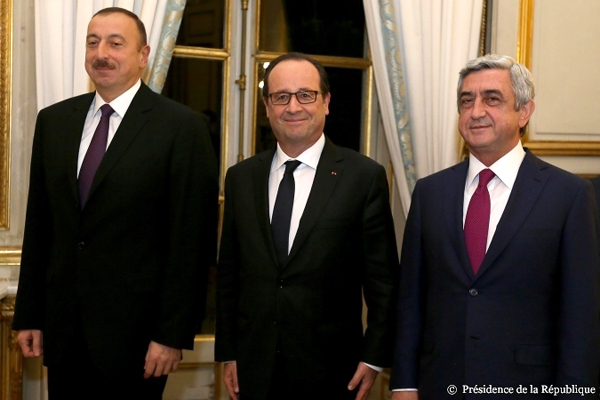Is official Baku ready to adopt the great peace agreement without agreeing on the principles of settlement?
In early December, in Basel, Switzerland, the next meeting of Foreign Ministers of Azerbaijan and Armenia may occur, which will be also attended by the OSCE Minsk Group co-chairs, reported Azerbaijan Foreign Minister Elmar Mammadyarov, recently, at the joint press conference following the meeting with the Foreign Minister of Hungary.
After the Paris meeting, the Azerbaijani authorities are clearly trying to show how Baku is encouraged, and even publish some details of the Paris meeting. “French President Francois Hollande emphasized that it is time to work on the peace agreement. As we know, there are the Madrid principles, true, some moments are not yet agreed. This conflict cannot be regulated in one day. We need to continue discussions on the issues that are not yet agreed upon. It is possible that in the near future, again, there will be a need for a meeting at the level of presidents,” said the Azerbaijani Foreign Minister.
Mammadyarov also mentioned that Azerbaijan considers the completion of the peace agreement important. “We want to establish contacts and relationships between the communities.” Baku again declares that everything will depend on Armenia’s constructive approach. “They say, remove the snipers from the frontline, and we are talking about the establishment of relationships between the communities,” said Mammadyarov, also adding that one cannot say that an important agreement was reached at the Paris meeting. As we know, a meeting of the presidents of Armenia and Azerbaijan is planned to be held next year, on September, in New York. With this regard, the Azerbaijani foreign minister said that currently an agreement is reached about the meetings at the presidential level, but prior to it, if necessary, the meeting of the presidents can occur as well.
Read also
Official Baku, actually, has already defined and publicized the “purpose”, which in the case reaching or not, it will have reasons in the “arsenal” of why the “progress” recorded in Paris failed. And the Paris “progress” is that the official Baku was adhere to the great peace agreement, neglecting the available Madrid principles on the negotiation table, as well as the fundamental principles of the Helsinki Final Act (non-use of force, territorial integrity, right to people’s self-determination and equality).
But interestingly, Baku seeks to illustrate that the French president has also agreed on this idea. While, given the fact that both the Madrid principles and the fundamental principles of the Helsinki Final Act are included in the statements adopted by the OSCE Minsk Group co-chair countries’ leader, we can conclude that the Azerbaijani authorities like to deal with self-deceit. In the near future, we will witness what kind of tactics Baku shows; they will constantly announce that they are waiting the progress on the great peace agreement suggested by Hollande in Paris. The representatives of intermediate countries have repeatedly said that the time for initialing of the comprehensive peace agreement has come, but it does not mean that the sequence of steps in the negotiation process should be broke. In other words, is official Baku ready to adopt the great peace agreement with agreeing on regulatory principles? This, of course, is less likely. But in the current situation, the Karabakh peace process may appear in an meaningless confusion because of the Baku position.
Emma GABRIELYAN






















































